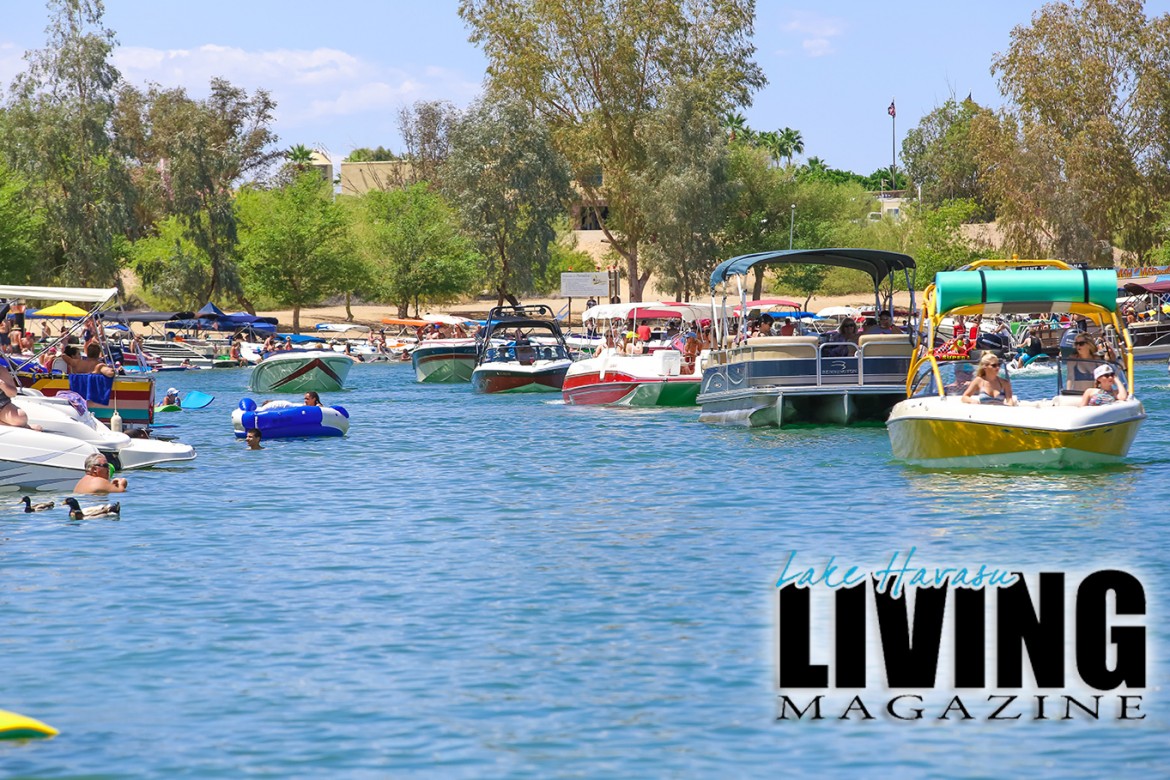Boating Etiquette—Safety and Fun Are Up to Everyone
Whether you’re in a pontoon boat or speedboat, everyone enjoying the lake wants to have a great day out on the water. And that means playing it safe by following some simple rules. After all, no one wants their day to end in tragedy.
If you’re a new or novice boater, it is highly recommended that you take a boating safety class in order to become oriented with the basics of boating. Statistically, boaters who have completed a National Association of State Boating Law Administrator (NASBLA)-approved course, certified by the state in which they reside, are 70 percent less likely to be involved in a boating accident. According to 2013 statistics, 158 watercraft operators in Arizona were involved in an accident. Of those, 108 people involved in an accident had no boating education. Anyone can call toll free at 800-824-2456 to find a boating safety class nearest to them. If you are involved in a boating accident but it wasn’t your fault then you might want to contact a law firm that may be able to help you like this Boat Accident Attorney Stewart Law Offices. You should do everything you can to avoid accidents from happening though.
All watercraft vessels are legally required to carry or have installed on their vessel certain equipment. The list below pertains to most watercraft on Lake Havasu.
Wearable Personal Flotation Devices (Life Vests): Coast Guard-approved, Type I, II, III or V, and one for each occupant on board.
Throwable Personal Flotation Device: At least one Coast Guard-approved, Type IV (this would include a cushion or ring buoy), easily accessible and in good working order.
Fire Extinguisher: All watercraft under 26′ and using any volatile liquid (gas, diesel, etc.) shall have on board a Coast Guard-approved Type B-1 fire extinguisher in a condition available for immediate and effective use. Vessels 26′ to less than 40′ in length must have two Coast Guard-approved Type B-1 fire extinguishers.
Navigation Lights: From sunset to sunrise, all watercraft shall display navigation lights – bright white on the aft (top) and a combination light at the bow (front) of the boat, green to starboard (right) and red to port (left).
Flame Arrestor: All watercraft using gasoline as fuel, except outboard motors, shall attach to the carburetor(s) a backfire flame arrestor approved for marine use and suitably secured to the air intake.
Blower: All watercraft, except open boats, using gasoline or other flammable fuel, shall have a blower (fan) to evacuate any explosive or flammable gases from the engine compartment.
Muffler: Watercraft must have mufflers to prevent excessive or unusual noise
Visual Distress Signals (VDS): Vessels on federally-controlled waters (such as the Colorado River and lake system) must be equipped with Coast Guard-approved VDS equipment, readily accessible and in good working order.
Because Lake Havasu sits on the border of California and Arizona, a number of regulatory agencies control enforcement on the lake. How many agencies? Well, quite a few. Eight to be exact. Here are a list of those agencies that can have jurisdiction on the water:
- Mohave County Sheriff’s Office
- San Bernardino County Sheriff’s Office
- Lake Havasu City Police Department
- Arizona Game and Fish Department
- California Department of Fish and Wildlife
- U.S. Fish and Wildlife Service
- Bureau of Land Management
- U.S. Coast Guard
The type of infraction and location of the offense will determine who has proper jurisdiction. For example, the Lake Havasu City Police Department likely would not enforce a violation related to natural resources down at Steamboat Cove. On the other hand, the Bureau of Land Management or Arizona Game and Fish Department likely would not pursue a disorderly conduct charge in the Bridgewater Channel. Ultimately, these agencies are in place to ensure public safety and will assist when necessary.
People often ask if drinking violations differ depending on which side of the lake you are detained. The short answer is that it doesn’t matter. If a violation happens between California and Arizona, the law enforcement in either state has jurisdiction over a criminal offense committed on Lake Havasu, since all agencies have concurrent jurisdiction to arrest, prosecute, and try offenders.
Even though the law is written slightly different in each state for OUI’s (AZ)/ BUI’s (CA), being impaired to the slightest degree is illegal. The misconception is that, although the legal limit is at .08% BAC (Blood Alcohol Content), if you have any drugs and/or alcohol in your system and become involved in a boating accident, you could be charged with an alcohol-related charge in addition to other offenses, depending on the circumstances.
There are definitely certain times of the year when the lake is busiest, and that would include the three major summer holidays: Memorial Day, Independence Day, and Labor Day. However; large racing events, poker runs, or regattas also draw a large number of boaters. Taking an approved boating safety class before operating or riding in a vessel will help to familiarize a person with all the basic laws along with safe boating practices. Also, make sure you have a sober operator since that person is responsible for all the people on board. Pay close attention to your surroundings at all times, and make sure no one is obstructing your view by standing in front of you. Don’t allow your passengers to ride on the bow or rear of your boat, especially with their feet in the water. Keep to the right, just like on the road. Boating can be a safe and fun recreational activity for everyone as long as we all pay attention. So let’s all get ready for a great boating season, and remember that by following all the rules of watercraft safety, we call all share the lake and have a fun, memorable summer.


